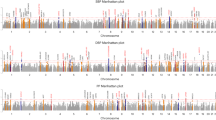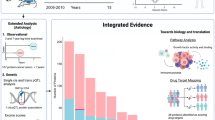Abstract
Fibrocalculous pancreatic diabetes (FCPD) is an uncommon cause of diabetes, seen mainly in developing countries. A family-based study was carried out in 67 Bangladeshi families, consisting of a proband with FCPD and both parents, to determine whether an association exists between FCPD susceptibility and either the major histocompatiblity complex (MHC) or insulin gene (INS) loci. HLA-DQB1 typing was done using allele-specific primers, and INS was typed using the restriction enzyme HphI. Three microsatellites (TNFa, TNFc and TNFd), from within and flanking the TNF-LT locus, were used for MHC Class IV typing and a PCR-RFLP assay was used to define the −308G/A TNF promoter polymorphism. The extended transmission disequilibrium test (ETDT) was used for statistical analysis. An overall association was observed between FCPD and HLA-DQB1 (P = 0.003), that was largely due to a positive association with HLA-DQB1*0302 and a negative association with HLA-DQB1*0202. Although no association was found between FCPD and TNF-LT microsatellite markers a trend was observed for TNFc (P = 0.037, Pc = 0.15). No association was found between FCPD and INS (P = 0.26). This study confirms an association between FCPD and the MHC using a family-based study design and the stringent ETDT analysis; a novel protective association was found with HLA-DQB1*0202 in Bangladeshi FCPD subjects. The genetic susceptibility to FCPD has features both similar and dissimilar to T1DM.
This is a preview of subscription content, access via your institution
Access options
Subscribe to this journal
Receive 6 digital issues and online access to articles
$119.00 per year
only $19.83 per issue
Buy this article
- Purchase on Springer Link
- Instant access to full article PDF
Prices may be subject to local taxes which are calculated during checkout
Similar content being viewed by others
References
WHO study group report on diabetes mellitus. WHO Technical Report Series 727 1985
Mohan V, Nagalotimath SJ, Yajnik CS, Tripathy BB . Fibrocalculous pancreatic diabetes Diabetes Metab Rev 1998 14: 153–170
Pitchumoni CS . Familial pancreatitis. In: Pai KN, Suman CR, Varghese R (eds) Pancreatic Diabetes Geoprinters: Trivandrum 1970 46–48
Yajnik CS, Sardesai BS, Bhat DS et al. Ketosis resistance in fibrocalculous pancreatic diabetes: II. Hepatic ketogenesis after oral medium-chain triglycerides Metabolism 1997 46: 1–4
Azad Khan AK, Ali L . Tropical calcific pancreatitis and fibrocalculus pancreatic diabetes in Bangladesh J Gastroenterol Hepatol 1997 12: S48–S52
Kambo PK, Hitman GA, Mohan V et al. The genetic predisposition to fibrocalculus pancreatic diabetes Diabetologia 1989 32: 45–51
Mohan V, Chari ST, Hitman GA et al. Familial aggregation in tropical fibrocalculous pancreatic diabetes Pancreas 1989 4: 690–693
Sanjeevi CB, Kanungo A, Shtauvere A, Samal KC, Tripathi BB . Association of HLA class II alleles with different subgroups of diabetes mellitus in eastern India identify different associations with IDDM and malnutrition-related diabetes Tissue Antigens 1999 54: 83–87
Sanjeevi CB, Seshiah V, Moller E, Olerup O . Different genetic backgrounds for malnutrition-related diabetes and type 1 (insulin-dependent) diabetes mellitus in south Indians Diabetologia 1992 35: 283–286
Mohan V, Deepa R, Bhatia E et al. Antibodies to pancreatic islet cell antigens in diabetes seen in southern India with particular reference to fibrocalculous pancreatic diabetes Diabet Med 1998 15: 156–159
Ramachandran A, Snehaltha C, Tuomilehto-Wolf E et al. T1DM in the offspring does not increase the risk of parental T2DM in south Indians Diabetes/Metab Res Rev 1999 15: 328–331
Price P, Witt C, Allcock R, Sayer D et al. The genetic basis for the association of the 8.1 ancestral haplotype (A1, B8, DR3) with multiple immunopathological diseases Immunol Rev 1999 167: 257–274
Mulcahy B, Waldron-Lynch F, McDermott MF et al. Genetic variability in the tumor necrosis factor-lymphotoxin (TNF-LT) region influences susceptibility to rheumatoid arthritis Am J Hum Genet 1996 59: 676–683
Hajeer AH, Worthington J, Silman AJ, Ollier WE . Association of tumor necrosis factor microsatellite polymorphisms with HLA-DRB1*04-bearing haplotypes in rheumatoid arthritis patients Arthritis Rheum 1996 39: 1109–1114
De Mouzon A, Docos E, Ohayon E, Hauptmann G . Bf and C4 markers for insulin-dependent diabetes in Basques Lancet 1979 2: 1364
Thomsen M, Molvig J, Zerbib A et al. The susceptibility to insulin-dependent diabetes mellitus is associated with C4 allotypes independently of the association with HLA-DQ alleles in HLA-DR3,4 heterozygotes Immunogenetics 1988 28: 320–327
Nejentsev S, Gombos Z, Laine A-P et al. Non–class II HLA gene associated with type 1 diabetes maps to the 240-kb region near HLA-B Diabetes 2000 49: 2217–2221
Pociot F, Briant L, Jongeneel CV et al. Association of tumur necrosis factor (TNF) and class II major histocompatibility complex alleles with the secretion of TNF-α and TNF-β by human mononuclear cells: a possible link to insulin-dependent diabetes mellitus Eur J Immunol 1993 23: 224–231
Wilson AG, Symons JA, McDowell TL, McDevitt HO, Duff GW . Effects of a polymorphism in the human tumor necrosis factor alpha promoter on transcriptional activation Proc Natl Acad Sci USA 1997 94: 3195–3199
Whichelow CE, Hitman GA, Raafat I, Bottazzo GF, Sachs JA . The effect of TNF*B gene polymorphism on TNF-alpha and -beta secretion levels in patients with insulin-dependent diabetes mellitus and healthy controls Eur J Immunogenet 1996 23: 425–435
Ellegren H . Microsatellite mutations in the germline: implications for evolutionary inference Trends Gene 2000 16: 551–558
Huxtable SJ, Saker PJ, Haddad L et al. Analysis of parent-offspring trios provides evidence for linkage and association between the insulin gene and type 2 diabetes mediated exclusively through paternally transmitted class III variable number tandem repeat alleles Diabetes 2000 49: 126–130
Udalova IA, Nedospasov SA, Webb GC, Chaplin DD, Turetskaya RL . Highly informative typing of the human TNF locus using six adjacent polymorphic markers Genomics 1993 16: 180–186
Allen MH, Wakelin SH, Holloway D et al. Association of TNFA gene polymorphism at position −308 with susceptibility to irritant contact dermatitis Immunogenetics 2000 51: 201–205
Metcalfe KA, Hitman GA, Fennessy MJ et al. In Finland insulin gene encoded susceptibility to IDDM exerts maximum effect when there is low HLA-DR associated risk Diabetologia 1995 38: 1223–1229
Sham PC, Curtis D . An extended transmission/disequilibrium test (TDT) for multi-allele marker loci Ann Hum Genet 1995 59: 323–336
Risch N, Merikangas K . The future of genetic studies of complex human diseases Science 1996 273: 1516–1517
Acknowledgements
We express our thanks to the subjects for participating in the study. We also acknowledge the contribution of the International Program in the Chemical Sciences (IPICS), Uppsala University, Sweden, for awarding Fellowships to Zahid Hassan and Zahangir Md. Chowdhury.
Author information
Authors and Affiliations
Corresponding author
Rights and permissions
About this article
Cite this article
Chowdhury, Z., McDermott, M., Davey, S. et al. Genetic susceptibility to fibrocalculous pancreatic diabetes in Bangladeshi subjects: a family study. Genes Immun 3, 5–8 (2002). https://doi.org/10.1038/sj.gene.6363814
Received:
Accepted:
Published:
Issue Date:
DOI: https://doi.org/10.1038/sj.gene.6363814
Keywords
This article is cited by
-
Fibrocalculous pancreatic diabetes in Bangladeshi children and adolescents—a not so rare form of secondary diabetes
International Journal of Diabetes in Developing Countries (2018)
-
Fibrocalculous pancreatic diabetes (FCPD)
Acta Diabetologica (2015)
-
Human Leukocyte Antigen Class II Alleles Are Associated with Risk of Alopecia Areata
Journal of Investigative Dermatology (2008)
-
Genetic aspects of tropical calcific pancreatitis
Reviews in Endocrine and Metabolic Disorders (2008)
-
Tropical pancreatitis
Journal of Gastroenterology (2007)



